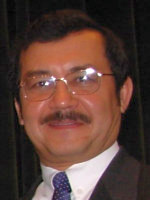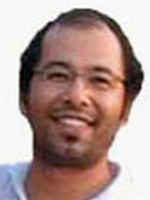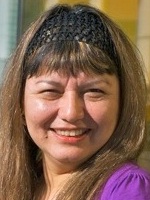Announcements |
||||||
| Jun 27 | Proceeding of the conference (only those in open access). | |||||
| Dec 8 | Thank you for attending MICAI! See you at MICAI 2014, in Chiapas! | |||||
|
Are you here by error? |
Announcements |
||||||
| Jun 27 | Proceeding of the conference (only those in open access). | |||||
| Dec 8 | Thank you for attending MICAI! See you at MICAI 2014, in Chiapas! | |||||
|
SMIA and
SMCC
Mexican International Conference |
November 24 to 30, 2013, Mexico City, Mexico
Springer LNAI
;
IEEE CPS; journals;
special issues of ISI JCR journals (anticipated).
Keynote speakers from MIT, Stirling (UK), NUS (Singapore), Chile, Mexico. Tours to unique attractions.
Acceptance rate (oral session - LNAI volume) target around 25% -
See information about student grants
Collocated: Workshops / Call for Workshops,
Call for Tutorials,
Call for Doctoral Consortium
Please distribute the CFP: long or short version
MICAI was
characterized by Springer as premier conference in Artificial
Intelligence. It is a
high-level peer-reviewed international conference covering all areas of
Artificial
Intelligence, traditionally held in
All previous editions of MICAI were published in Springer LNAI, and the Special Sessions of most of the past MICAI events have been published by the CPS; At past MICAI events, extended versions of over 50% of the LNAI papers were invited to special issues of journals, including ISI JCR-indexed journals; see for example a special issue on MICAI of Expert Systems with Applications. Recent MICAI events received over 300–400 submissions from over 40 countries each, with acceptance rate around 25% for the main session.
Publication: Papers accepted for long oral presentation will be published by Springer in a volume of the series Lecture Notes in Artificial Intelligence (LNAI). Special Session papers (or main session papers of which the authors choose this) will be published by IEEE CPS. Best papers awards will be granted to the 1st, 2nd and 3rd places. Special issues of journals are anticipated for best papers. Extended versions of selected papers are expected to be invited to special issues of journals, including ISI JCR-indexed journals. Traditionally at MICAI, the results of the SMIA Best Thesis in Artificial Intelligence Contest are announced (see also this call).
MICAI keynote talks will be transmitted via Internet, see OpenMICAI.
| Passed |
|
Payment and papers deadlines |
| November 24 to 26, 2013 | Pre-conference events (workshops, tutorials, meetings) | |
| November 27 to 29, 2013 | Main conference (keynote and regular talks, cultural program) | |
| November 30, 2013 | Post-conference events (meetings, cultural program) |
|
The following tours are anticipated:
|
 |
Ildar Batyrshin,
IMP,
Mexico Time Series Shape Association Measures A need in time series shape association measures appears in time series clustering, search in time series data bases, time series data mining, time series pattern recognition, in statistics and in data driven analysis of relationships between elements of dynamic systems. The talk will consider different methods of definition of time series shape similarity and shape association measures and their properties. Tutorial: Perception Based Approach to Time Series Analysis Ildar Baryrshin holds a Dr. Sci. in Mathematics (Theoretical Fundamentals of Informatics) from the Institute of Program Systems, Russian Academy of Sciences, and Ph.D. in Computer Science from the Moscow Power Engineering Institute (Technical University), Moscow, USSR. He was Head of Department and Professor at Kazan State Technological University, Russia, and is currently a researcher at the National Oil Institute, Mexico. His research interests include Artificial Intelligence and Expert Systems, Fuzzy Logic and Soft Computing, Decision-Making Systems, Cluster Analysis, and Applied Semiotics. He is author of numerous research publications in the theory of fuzzy systems. |
 |
Erik Cambria,
National
U. of Singapore SenticNet: Helping Machines to Learn, Leverage, Love SenticNet is a publicly available semantic and affective resource for concept-level opinion and sentiment analysis. SenticNet is built by means of sentic computing, a multi-disciplinary approach to sentiment analysis at the crossroads between affective computing and common sense computing, which exploits both computer and social sciences to better recognize, interpret, and process opinions and sentiments over the Web. In sentic computing, whose term derives from the Latin sentire (root of words such as sentiment and sentience) and sensus (intended both as capability of feeling and as common sense), the analysis of natural language is based on affective ontologies and common sense reasoning tools, which enable the analysis of text not only at document-, page- or paragraph-level, but also at sentence-, clause-, and concept-level. In particular, sentic computing involves the use of AI and Semantic Web techniques, for knowledge representation and inference; mathematics, for carrying out tasks such as graph mining and multi-dimensionality reduction; linguistics, for discourse analysis and pragmatics; psychology, for cognitive and affective modeling; sociology, for understanding social network dynamics and social influence; finally ethics, for understanding related issues about the nature of mind and the creation of emotional machines. Erik Cambria received his BEng and MEng with honours in Electronic Engineering from the University of Genova, in 2005 and 2008 respectively. In 2011, he was awarded his PhD in Computing Science and Mathematics, following the completion of an industrial Cooperative Awards in Science and Engineering (CASE) research project, funded by the UK Engineering and Physical Sciences Research Council (EPSRC), which was born from the collaboration between the University of Stirling, the MIT Media Laboratory, and Sitekit Solutions Ltd. Today, Erik is a research scientist at the National University of Singapore (Cognitive Science Programme, Temasek Laboratories) and an associate researcher at the Massachusetts Institute of Technology (Synthetic Intelligence Project, Media Laboratory). His interests include AI, Semantic Web, KR, NLP, big social data analysis, affective and cognitive modelling, intention awareness, HCI, and e-health. Erik is invited speaker/tutor in many international venues, e.g., IEEE SSCI and WWW, associate editor of Springer Cognitive Computation, and guest editor of leading AI journals, e.g., IEEE Intelligent Systems and Elsevier Neural Networks. He is also chair of several international conferences, e.g., Brain Inspired Cognitive Systems (BICS), symposia, e.g., Extreme Learning Machines (ELM), and workshop series, e.g., ICDM SENTIRE, KDD WISDOM, and WWW MABSDA. Additionally, he is a fellow of the Brain Sciences Foundation, the National Laboratory of Pattern Recognition (NLPR - Institute of Automation, Chinese Academy of Sciences), the National Taiwan University, Microsoft Research Asia, and HP Labs India. |
 |
Newton Howard,
MIT, USA Rethinking Artificial Intelligence The modern school of Artificial Intelligence was originally expected to provide a full working model of intelligence as a set of procedures. Scholars implemented these procedures over time to conceptualize the notion of an intelligent machine. Computer scientists rushed to implement working models that would allegedly reach beyond many limits. Perhaps the most debilitating act was equating what is efficient in procedures to what is artificialized in intelligence. Equally debilitating was interpreting the speed of arithmetic calculations as a quantifier: it led to teams being interpreting speed and accuracy as reflections of intelligence. In order to reach an artificial form of intelligence that is faithful to the amalgam of biological, physical and chemical that it seeks to imitate; scholars of AI must reach a deeper synthesis of its integrative nature, leading to the creation of many artificial synthetic forms of Intelligence, instead of a single vision of intelligence that simply focuses on matching the performance of the human brain. Having said that, we can clearly concur that most of the AI Modern School’s limitations have been discovered and are well-documented and known to the AI community. Our aim is to discuss a number of these issues, particularly the limits previously described. We avow that these limits emerged from epistemological misunderstandings on the perceived meanings of intelligence itself, leading to the limits imposed in the current interpretations of AI. Future work in AI, or alternatively coined Synthetic Intelligence, must revisit fundamental assumptions about the nature of the brain, cognition, computing, and intelligence. Synthetic Intelligence focuses on the phenomena such as intelligence and consciousness, and mapping them to the physics of the brain and models of brain processes at each of its multiple levels. It is the ‘stack’ of brain subsystems at multiple levels, from cortical down to molecular, joined by a common thread, that make up a mind. What we need are mathematically described mechanisms and information structures to integrate computational discourse analysis, value systems, mapping of cognitive structures to neuron interactions and to the molecular mechanisms of such interactions. The key to this discovery will be the study of emergence of intelligence and consciousness in engineered systems –implemented in silico or in vitro. Newton Howard is the Director of the Synthetic Intelligence Lab and a resident scientist at MIT. He holds PhD in Cognitive Informatics and Mathematics from La Sorbonne, France where he was also awarded the Habilitation a Diriger des Recherches for his leading work on the Physics of Cognition (PoC) and its applications to complex medical, economical and security equilibriums. While a graduate member of the Faculty of Mathematical Sciences at the University of Oxford, England, he proposed the Theory of Intention Awareness (IA), which made a significant impact on the design of command and control systems and information exchange systems at tactical operational and strategic levels. He has served as the Chairman of the Center for Advanced Defense Studies (CADS), the leading Washington, D.C, National Security Group and is currently its board director. He is a national security advisor to several U.S. Government organizations. He recently published The Mood State Indicators (MSI) algorithm, which models and explains the mental processes involved in human speech and writing, to predict emotional states. His natural-language approach to systems understanding and design pointed to the multi-dimensional structures embedded and nested within speech-based cognitive systems, which have led to much advancement in building more accurate cognitive engines for modeling behavioral and cognitive feedback. Dr. Howard works with multi-disciplinary teams of physicists, chemists, biologists, brain scientists, computer scientists, and engineers to reach a deeper understanding of the brain. His research aims to improve the quality of life for so many who suffer from degenerating conditions currently considered incurable. He founded the Mind Machine Project at MIT; an interdisciplinary initiative to reconcile natural intelligence with machine intelligence. He established the Brain Sciences Foundation (BSF), a multidisciplinary research foundation dedicated to developing novel paradigms for the study of both mind and brain and ultimately the treatment of neurological disorders. He currently works on functional brain and neuron interfacing abilities using theoretical mathematical models to represent the exchange of information inside the human brain. This work, called the Fundamental Code Unit (FCU), has proven applicable in the diagnosis and study of brain disorders and has led to important pharmacological and therapeutic tools for physicians. He has developed individualized strategies to incorporate solutions for psychiatric and brain prosthetics and has been working on interventions for early detection and novel treatment strategies for neurodegenerative diseases and affective disorders. |
 |
Maria Vargas-Vera,
Universidad Adolfo
Ibanez, Chile
Multi-Agent Ontology Mapping Framework for the Semantic Web Ontology mapping is prerequisite for achieving heterogeneous data integration on the Semantic Web. The vision of the Semantic Web implies that a large number of ontologies present on the web need to be aligned before one can make use of them for example, a question answering. At the same time these ontologies can be used as domain specific background knowledge by the ontology mapping systems in order to increase the mapping precision. These ontologies however, can differ in representation, quality and size that pose different challenges for ontology mapping. In this talk I will analyse these challenges and introduce a multi-agent ontology mapping framework that has been designed to operate effectively in the Semantic Web environment. Maria Vargas-Vera received her PhD from the Artificial Intelligence Department at Edinburgh University in 1995 and she was awarded Fellow of the British Computer Society (FBCS) from November 2009. Dr. Vargas-Vera is a Professor at Adolfo Ibanez University, Chile. Her current research focuses on Ontology Mapping, Question Answering and Applications using Semantic Web Technologies. Dr Vargas-Vera has published many research papers in international conferences and journals and she is also a member of program committees of international Conferences. Dr Vargas-Vera is an Associated Editor, the International Journal of Knowledge and Learning (IJKL) and the Journal of Emerging Technologies in Web Intelligence (JETWI). |
 |
NEW
Andrei
Voronkov,
University of Manchester, UK First-Order Theorem Proving and Vampire Automatic theorem proving has a number of important applications, such as Software Verification, Hardware Verification, Hardware Design, Knowledge Representation and Reasoning, Semantic Web, Algebra and Proving Theorems in Mathematics. Over 50 years of research in theorem proving have resulted in one of the most advanced and elegant theories in computer science. This area is an ideal target for scientific engineering: implementation techniques have to be developed to realise an advanced theory in practically valuable tools. Vampire is a theorem prover, that is, a system able to prove theorems. More precisely, it proves theorems in first-order logic. Vampire is very fast, as can be judged by its awards. Note by the organizers: Andrei is the creator of the EasyChair system used by about 27 thousand conferences and almost a million users! Without his huge work on this system, world's science would not be what it is: 27 thousand conferences, including MICAI, would not be possible. A huge thank you to Andrei for the very existence of MICAI! |
Topics of interest are all areas of Artificial Intelligence, including but not limited to:
|
|
NEW See registration fees for non-author attendees (main conference, tutorials, and workshops) and workshop authors.
The registration fee amount for authors is USD 590 or MXN 8000. This includes one paper only. If one author has more than one accepted paper, in order for the papers to be published the fee is to be paid for each of them independently, with a discount of USD 100 or MXN 1200, i.e., for the second etc. paper presented by the same author, an additional fee of USD 490 or MXN 6800 is to be paid.
This fee includes publication of one paper (up to the page limit) in any of the proceedings volumes or journal issues derived from the conference, one hard copy of a proceedings volume (where the corresponding paper was published; other volumes are not included), access to a digital copy of the pre-print versions of all accepted papers (unless copyright holders prevent us from distributing such copies), conference material, and attending the keynote lectures, regular technical presentations, and the poster session.
Additional fee applies for papers that exceed the page limit (USD 10 per additional page, in either review or camera-ready version, whichever is greater), for purchasing additional copies of the proceedings (USD 75), for participating in some of the cultural activities, and for accompanying persons to participate in some of the cultural activities.
|
Non-authors can register now and will be able to register on site.
A very limited number of student grants for full-time students from developing countries (Mexico included) will be given to applicants in thoroughly justified cases and only to the applicants that will attend the conference in person. Strong preference will be given to the authors of the papers that received excellent evaluation scores and of which the applicant is the main author.
MICAI accepted for evaluation original research papers written in English, The not previously published or under review for another conference or journal. Only complete and finished papers were reviewed, not abstracts.
See more information on submission procedure.
Workshops, Tutorials, Doctoral Consortium
Workshops and tutorials will be organized in conjunction with MICAI 2013; see Workshops / Call for Workshops, Tutorials / Call for Tutorials, Call for Doctoral Consortium.
Accepted workshops:
| 6th Workshop on Intelligent Learning Environments (WILE 2013) |
Accepted tutorials:
|
Ted Pedersen (USA). Measuring the Similarity and Relatedness of Concepts Nelishia Pillay (South Africa). Hyper-Heuristics for Combinatorial Optimization. Roman Barták (Czech Rep.). Alexander Garcia Castro (Germany). Ontology engineering for the Semantic Web. NEW Michal Wozniak. Hybrid classifiers and data stream recognition. NEW Erik Cambria (Singapore). Sentic computing (tentative). NEW Howard Newton (USA). Brain and Intelligence (tentative). Obdulia Pichardo, Grigori Sidorov. Fundamentos de recuperación textual en Python. Alexander Gelbukh. Introduction to Natural Language Processing. and more to be announced. |
MICAI 2013 will be held in Mexico City, at the the Universidad Autónoma Metropolitana Unidad Azcapotzalco (address).
Getting to UAM Azcapotzalco: how to get to the conference place.
Accommodation: recommended hotels in the historical
city center (daily transportation to the conference place will be
provided) or as an option hotels near the conference venue.
Note:
there was a problem with Ramada hotel, please do not book rooms there.
See alternative suggestions on
Accommodation page.
Local Committee's page contains the following information:
|
|
Venue contact person: Oscar Herrera Alcántara.
|
NEW See Detailed program.
See accepted papers.
Poster Presentation Guidelines: instructions for preparation of posters.
OpenMICAI: Information on Internet transmission of MICAI keynote talks. |
Conference chairs:
Alexander Gelbukh, Grigori Sidorov,
Raúl Monroy
Program chairs:
Miguel Gonzalez Mendoza,
Félix Castro,
Alexander Gelbukh
Finance and publication chair: Ildar Batyrshin
Local organizing committee chair: Oscar Herrera Alcántara
Track chairs
|
Natural Language Processing |
Sofia N. Galicia-Haro |
|
|
Machine Learning and Pattern Recognition |
Alexander Gelbukh |
|
|
Data Mining |
Felix Castro Espinoza |
|
|
Intelligent Tutoring Systems |
Alexander Gelbukh |
|
|
Evolutionary and Nature-Inspired Metaheuristic Algorithms |
Oliver Schütze, Jaime Mora Vargas |
|
|
Computer Vision and Image Processing |
Oscar Herrera |
|
|
Robotics, Planning and Scheduling |
Fernando Martin Montes-Gonzalez |
|
|
Neural Networks and Hybrid Intelligent Systems |
Sergio Ledesma-Orozco |
|
|
Logic, Knowledge-Based Systems, Multi-Agent Systems and Distributed AI |
Mauricio Osorio, Jose Raymundo Marcial Romero |
|
|
Fuzzy Systems and Probabilistic Models in Decision Making |
Ildar Batyrshin |
|
|
Bioinformatics and Medical Applications |
Jesus A. Gonzalez, Felipe Orihuela-Espina |
Program Committee
| Abraham Sánchez López (Mexico) Adriana Lara (Mexico) Albert Bifet (New Zealand) Alberto Ochoa O.Zezzatti Alberto Reyes (Mexico) Alejandro Rosales (Mexico) Alessandro Ricci (Italy) Alexander Gelbukh (Mexico) Alexey Petrovsky Alfonso Alba (Mexico) Alfredo Arias-Montaño (Mexico) Alfredo Gabaldon (Portugal) Alla Zaboleeva-Zotova Ana Gabriela Gallardo-Hernández (Mexico) Andrea Formisano (Italy) Andriy Sadovnychyy (Mexico) Angel Kuri-Morales (Mexico) Anilu Franco (Mexico) Annalisa Appice (Italy) Antonio Hernandez (Mexico) Antonio Marin Hernandez (Mexico) Antonio Vega Corona Antonio-José Sánchez-Salmerón Arles Rodriguez (Colombia) Arturo Garcia Perez Arturo Gonzalez (Mexico) Ashraf Abdelraouf Asif Ekbal (Italy) Atsuhiro Takasu (Japan) Aurelio Lopez (Mexico) Beatrice Duval Berend Jan Van Der Zwaag Bernardete Ribeiro (Portugal) Bert Bredeweg (Netherlands) Bogdan Smolka (Poland) Bruno Lara C. Alberto Ochoa-Zezatti (Mexico) Carlos A Reyes-Garcia Carlos Adolfo Piña-García (UK) Carlos Gracios (Czech Republic) Carlos Hugo Garcia Capulin Carlos Rubín Montoro Sanjose Carolina Reta (Mexico) Christian Grimme Claude Frasson (Canada) Claudia Manfredi Claudia Zepeda Cortes (Mexico) Cornelio Yáñez-Márquez (Mexico) D Gutiérrez (Mexico) Dario Landa-Silva (UK) David Claudio Gonzalez David Pinto (Mexico) De Ita Luna Guillermo (Mexico) Denis Filatov (Mexico) Derong Liu Dieter Hutter (Germany) Dieter Mitsche (Spain) Donato Hernandez Fusilier Dongfeng Han (USA) Eber Enrique Orozco Guillén (Mexico) Edgar Chavez (Mexico) Edgar Vallejo (Mexico) Eduardo Cabal Eduardo Gomez-Ramirez (Mexico) Eduardo Rodriguez-Tello (Mexico) Efren Gorrostieta (Mexico) Efren Mezura Elliot Soloway (USA) |
Enrique De La Rosa (Mexico) Erik Cuevas (Mexico) Erik Rodner (Germany) Eugene Ezin Eva Hernandez Gress (Mexico) Felipe Orihuela-Espina (Mexico) Felix Calderon (Mexico) Felix Castro (Mexico) Felix Castro Espinoza (Mexico) Felix F. Gonzalez-Navarro (Mexico) Fernando Aldana (Mexico) Fernando Martin Montes-Gonzalez (Mexico) Fernando Montes (Mexico) Fevrier Valdez (Mexico) François Rioult (France) Francisco Martínez-Álvarez (Spain) Francois Vialatte Friedhelm Schwenker (Germany) García Gamboa Ariel Lucien (Mexico) Genny Tortora Gerardo Sierra (Mexico) Gibran Etcheverry Gideon Avigad (Israel) Gladys Maestre (Venezuela) Gregorio Toscano-Pulido (Mexico) Grigori Sidorov (Mexico) Guillermo Morales-Luna (Mexico) Guillermo Sanchez-Diaz (Mexico) Gustavo Arroyo Gustavo Cerda Villafana Héctor A Montes (Mexico) Héctor Jiménez Salazar (Mexico) Héctor Pérez-Urbina (USA) Hartmut Haehnel Hayde Peregrina-Barreto (Mexico) Helen Pain (UK) Heriberto Cuayahuitl (UK) Hiram Calvo (Mexico) Horacio Rodriguez (Spain) Horacio Rostro Gonzalez Hugo Jair Escalante (Mexico) Hugo Terashima Humberto Sossa Azuela Ildar Batyrshin (Mexico) Iria Da Cunha (Spain) Iryna Yevseyeva (Netherlands) Ivan Olmos (Mexico) Ivan Vladimir Meza Ruiz (Mexico) Ivo Buzon (Mexico) J A Hernandez Servin (Mexico) J. Gabriel Avina-Cervantes (Mexico) J.C. Seck-Tuoh (Mexico) Jaime Mora Vargas (Mexico) James Lam (Hong Kong) Javad Alirezaie (Canada) Javier Vigueras (Mexico) Jerzy Martyna (Poland) Jesús Emeterio Navarro-Barrientos (USA) Jesus A. Gonzalez (Mexico) Jesus Angulo (France) Jin-Kao Hao Joaquin Gutierrez (Mexico) Joel Quintanilla Dominguez Jordi Vitrià Jorge Solís Jorn Mehnen (UK) José Fco. Martínez-Trinidad José Joel González Barbosa |
Jose Amparo Andrade Lucio Jose Arrazola (Mexico) Jose Luis Carballido (Mexico) Jose Raymundo Marcial Romero (Mexico) Jose Ruiz Pinales Jose Santos (Spain) Joseph Modayil (Canada) Josue Velazquez (Mexico) Juan Antonio Navarro Perez (UK) Juan Arturo Nolazco Flores (Mexico) Juan Arturo Nolazco Flores Juan Carlos Leyva Lopez (Mexico) Juan Carlos Nieves (Sweden) Juan Frausto-Solis (Mexico) Juan Gabriel Aviña Cervantes Juan J. Flores (Mexico) Juan Manuel Lopez Hernandez Juan-Carlos Acosta Justin Dauwels Katia Rodriguez Konstantinos Koutroumbas (Greece) Laetitia Jourdan (France) Leandro Fermín Rojas Peña Leonardo Trujillo (Mexico) Leopoldo Altamirano (Mexico) Leszek Nowak (Poland) Luís Moniz Pereira (Portugal) Luis Enrique Sucar (Mexico) Luis Lorenzo Rascon Perez (Mexico) Luis Martí (Brazil) Luz Abril Torres-Méndez (Mexico) Ma. De Guadalupe Garcia Hernandez Magdalena Ortiz (Austria) Manuel Montes-Y-Gómez (Mexico) Manuel Vilares Ferro (Spain) María Auxilio Medina Nieto (Mexico) Marco Antonio Morales Aguirre (Mexico) Marco Antonio Ramos Corchado (Mexico) Maria De Marsico (Italy) Maria Guadalupe Cortina Januchs Maria Lucia Barrón-Estrada Mario Alberto Ibarra Manzano Mario Castelán (Mexico) Mario Pavone (Italy) Marta Ruiz Costa-Jussa (Spain) Martine Ceberio (USA) Masaki Murata (Japan) Mauricio Osorio (Mexico) Michael Emmerich Michele Ceccarelli (Italy) Michele Nappi (Italy) Miguel Gonzalez (Mexico) Miguel Gonzalez Mendoza (Mexico) Miguel Torres Cisneros Mikhail Mikhailov (Finland) Monique Grandbastien (France) Mu-Chun Su (Taiwan) Natalia Ponomareva (UK) Nicandro Cruz-Ramirez Nicoletta Calzolari (Italy) Niladri Chatterjee (India) Obdulia Pichardo-Lagunas (Mexico) Oleksiy Shulika Olga Kolesnikova (Mexico) Olga Kolesnikova (Russian Federation) Oliver Schütze (Mexico) Omar Lopez Onofrio Gigliotta (Italy) |
Orion Fausto Reyes-Galaviz Oscar Alonso Ramírez (Mexico) Oscar Castillo (Mexico) Oscar Dalmau (Mexico) Oscar Gerardo Ibarra Manzano Oscar Herrera (Mexico) Pablo H. Ibarguengoytia (Mexico) Panagiotis Vlamos (Greece) Paolo Rosso (Spain) Patricia Melin (Mexico) Patrick Siarry (France) Paul Scheunders (Belgium) Pedro Flores (Mexico) Peter Sosnin (Russian Federation) Pilar Gomez-Gil Pinar Karagoz (Turkey) Ponciano Jorge Escamilla-Ambrosio (Mexico) Qinglai Wei R. Carolina Medina-Ramirez (Mexico) Rafael Guzman Cabrera Ramon Zatarain Raul Enrique Sanchez Yañez Raul Monroy (Mexico) Reinhard Langmann Rene Alfredo Martinez Celorio Ricardo Landa (Mexico) Ricardo Martinez (Mexico) Risto Rangel-Kuoppa Rocio Alfonsina Lizarraga Morales Rodolfo Ibarra-Orozco (Mexico) Rodrigo Edgar Palacios Leyva Ruslan Gabbasov (Mexico) Ruth Ivonne Mata Chavez Sabino Miranda-Jiménez (Mexico) Salem Benferhat (France) Salvador Ruiz Correa (Mexico) Salvatore Tabbone (France) Samuel Rota Bulò (Italy) Serge Autexier (Germany) Sergio Daniel Cano Ortiz Sergio Ledesma (Mexico) Sergio Ledesma Orozco Sergio Ledesma-Orozco (Mexico) Shiliang Sun (China) Sivaji Bandyopadhyay (India) Sofia N. Galicia-Haro (Mexico) Stefania Costantini (Italy) Stephane Marchand-Maillet (Switzerland) Tanja Magoc (USA) Ted Pedersen (USA) Teresa Alarcón (Mexico) Timoleon Kipouros (UK) Vicente Milanés (Spain) Vicente Parra Victor Ayala Ramirez Victor Ayala-Ramirez (Mexico) Virgilio Lopez (Mexico) Vlad Estivill-Castro (Australia) Vladik Kreinovich (USA) Volodymyr Ponomaryov (Mexico) W. Lewis Johnson (USA) Yasunari Harada (Japan) Yoel Ledo Yulia Ledeneva (Russian Federation) Zhanshan Wang Zhe Chen Zhigang Zeng |
|
|
Download the famous |
Not to be confused with MICCAI.